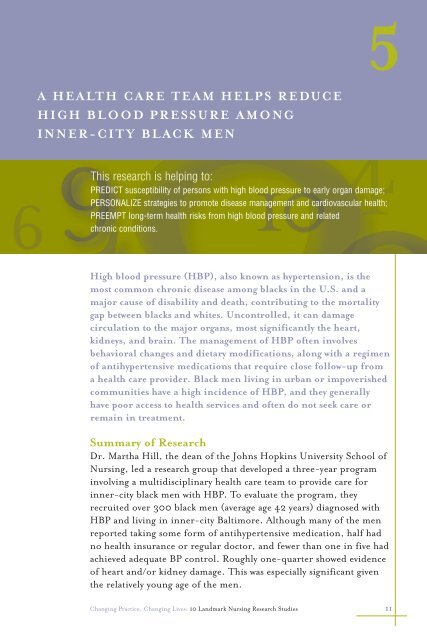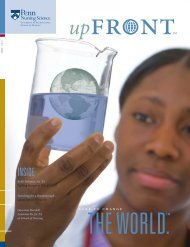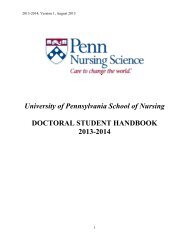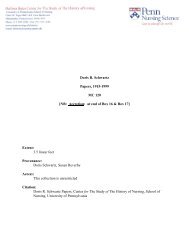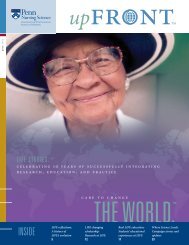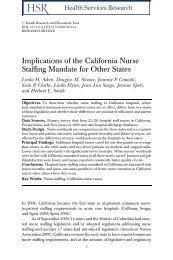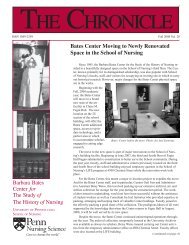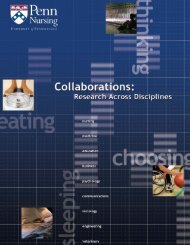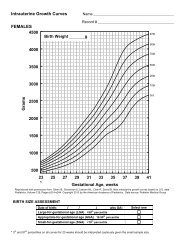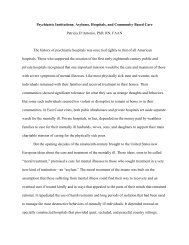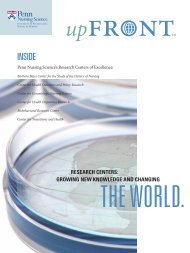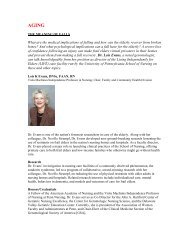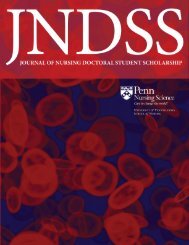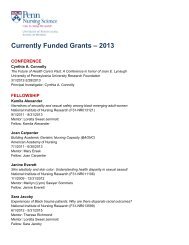10 Landmark Nursing Research Studies - National Institute of ...
10 Landmark Nursing Research Studies - National Institute of ...
10 Landmark Nursing Research Studies - National Institute of ...
Create successful ePaper yourself
Turn your PDF publications into a flip-book with our unique Google optimized e-Paper software.
A HEALTH CARE TEAM HELPS REDUCE<br />
HIGH BLOOD PRESSURE AMONG<br />
INNER-CITY BLACK MEN<br />
5<br />
This research is helping to:<br />
PREDICT susceptibility <strong>of</strong> persons with high blood pressure to early organ damage;<br />
PERSONALIZE strategies to promote disease management and cardiovascular health;<br />
PREEMPT long-term health risks from high blood pressure and related<br />
chronic conditions.<br />
High blood pressure (HBP), also known as hypertension, is the<br />
most common chronic disease among blacks in the U.S. and a<br />
major cause <strong>of</strong> disability and death, contributing to the mortality<br />
gap between blacks and whites. Uncontrolled, it can damage<br />
circulation to the major organs, most significantly the heart,<br />
kidneys, and brain. The management <strong>of</strong> HBP <strong>of</strong>ten involves<br />
behavioral changes and dietary modifications, along with a regimen<br />
<strong>of</strong> antihypertensive medications that require close follow-up from<br />
a health care provider. Black men living in urban or impoverished<br />
communities have a high incidence <strong>of</strong> HBP, and they generally<br />
have poor access to health services and <strong>of</strong>ten do not seek care or<br />
remain in treatment.<br />
Summary <strong>of</strong> <strong>Research</strong><br />
Dr. Martha Hill, the dean <strong>of</strong> the Johns Hopkins University School <strong>of</strong><br />
<strong>Nursing</strong>, led a research group that developed a three-year program<br />
involving a multidisciplinary health care team to provide care for<br />
inner-city black men with HBP. To evaluate the program, they<br />
recruited over 300 black men (average age 42 years) diagnosed with<br />
HBP and living in inner-city Baltimore. Although many <strong>of</strong> the men<br />
reported taking some form <strong>of</strong> antihypertensive medication, half had<br />
no health insurance or regular doctor, and fewer than one in five had<br />
achieved adequate BP control. Roughly one-quarter showed evidence<br />
<strong>of</strong> heart and/or kidney damage. This was especially significant given<br />
the relatively young age <strong>of</strong> the men.<br />
Changing Practice, Changing Lives: <strong>10</strong> <strong>Landmark</strong> <strong>Nursing</strong> <strong>Research</strong> <strong>Studies</strong> 11


